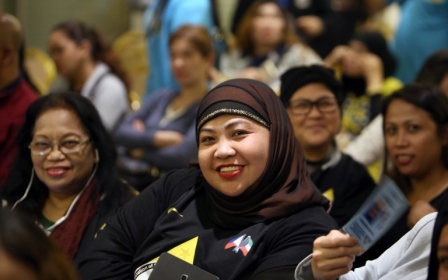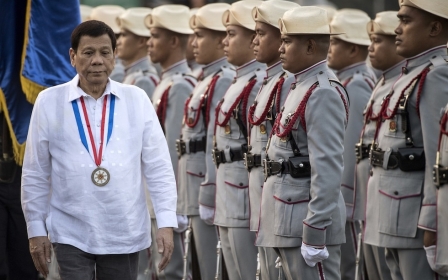Kuwait court sentences couple to death for Filipina maid's murder

A Kuwaiti court has sentenced a Lebanese man and his Syrian wife to death after they were convicted in absentia of killing a Filipina maid in a case that triggered a crisis between the Philippines and the Gulf Arab state, Kuwaiti newspapers reported on Sunday.
Philippines President Rodrigo Duterte last month ordered workers in Kuwait to return home over alleged abuse following the discovery of 29-year-old Joanna Demafelis’s body in a freezer in the abandoned home of a Lebanese man and his Syrian wife.
Kuwaiti newspaper al-Rai said the pair were convicted in absentia of premeditated murder. Al-Qabas, another newspaper, said the criminal court issued its verdict at its first hearing, convicting the pair of "killing the Filipina worker and putting her body in the freezer".
It said the murder was discovered more than a year after it had taken place and that the couple had been sentenced in absentia. Both newspapers reported the death sentence.
The sentencing can still be appealed if the couple returns to Kuwait, a source told AFP news agency on condition of anonymity.
The Demafelis murder triggered a diplomatic crisis between Kuwait and the Philippines, prompting Manila to impose a departure ban for its citizens planning to work in the Gulf state.
Concern for migrant workers in Gulf states
The Lebanese-Syrian couple was arrested in February in the Syrian capital Damascus following an Interpol manhunt.
Syrian authorities handed the husband, Nader Essam Assaf, over to Lebanese authorities, while his Syrian wife remained in custody in Damascus.
An estimated 252,000 Filipinos and Filipinas work in Kuwait and depend on remittances to help their families back home. Most work as domestic helpers with large numbers also residing in the United Arab Emirates, Saudi Arabia and Qatar.
Rights groups have raised the alarm around the plight of workers in the Gulf and other Arab countries, where migrant labour is regulated under a system known as "kafala".
The kafala, or sponsorship, system ties migrant workers' visas to their employers, prohibiting workers from leaving or changing jobs without prior consent.
Kuwait and the Philippines, eager to end the crisis, signed an agreement last month regulating some working conditions for domestic workers in the Gulf Arab State.
New MEE newsletter: Jerusalem Dispatch
Sign up to get the latest insights and analysis on Israel-Palestine, alongside Turkey Unpacked and other MEE newsletters
Middle East Eye delivers independent and unrivalled coverage and analysis of the Middle East, North Africa and beyond. To learn more about republishing this content and the associated fees, please fill out this form. More about MEE can be found here.




